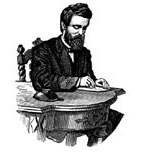
Are Islam & Democracy Compatible?
TOCQUEVILLE INVESTIGATES
Many perceive a threat in the large-scale migration of North Africans and Middle Easterners to countries such as France, Germany, England, and even the U.S. They often attribute that threat to the significant percentage of those migrants who practice “radical” Islam. Fear and concern about Islam remain high throughout the world, especially in the West, since Islam is the only outside force that ever threatened the survival of the West — and it did so more than once! Many have also begun to question whether Islam accounts for these immigrants’ failure to assimilate into their destination countries and their perpetrating violence both within and outside of their native countries. Alexis de Tocqueville, a 19th-century French political thinker, historian, and moralist can help us define the precise risk Islam poses.
One of the most penetrating theorists in political history, Tocqueville is best known for his two-volume Democracy in America. His degree of understanding of America was unprecedented and remains unduplicated. The first thing that struck Tocqueville about our new nation was its religious atmosphere. He considered the Christian religion, especially Catholicism, and the separation of church and state to be the primary reasons why Americans were able to avoid the pitfalls of democracy: selfish individualism, consumerism, conformity, a disregard for the past and future, and, ultimately, the establishment of a despotic state. Tocqueville depicted Americans as constrained by an all-pervasive spiritual power without a state-controlled religious establishment.
The practical, political, and social effects of different forms of spirituality — in particular, the relationship between religion, democratic society, and freedom — fascinated Tocqueville. He considered religion necessary to democratic societies for three reasons: (1) the relationship between religion and materialism, (2) the psychological relationship between religious belief and freedom, and (3) the relationship between religion and the state. He used these relationships to evaluate particular religions, including Islam.
In the first volume of Democracy in America (1835), Tocqueville makes only one brief reference to Islam. But by the time he wrote volume two (1840), in which he gives a second reference to Islam, he had read significant portions of the Koran. His political involvement with France’s colonization efforts led him to Algeria in 1841 and 1846, about which he wrote two reports in an attempt to explain that country and the religion of its inhabitants.
You May Also Enjoy
When we resist the demands of militant Islam, we are met not with pluralist-themed discussions or congenial tolerance but violence.
As much as we assume Christianity's home is Europe, the reality is that, in its first few centuries, Christianity was far more Middle Eastern than European.
The Gerusalemme liberata is an acknowledged masterpiece of world literature and a culmination of Italian Renaissance poetry.

